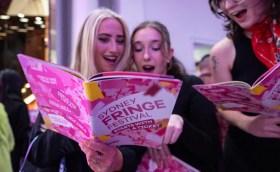Image by Pickersgill Reef on Flickr.
Contemporary Australian artists work at all ends of the creative spectrum. But it doesn’t matter if you are in experimental avant-garde, fringe or independent scene, the high end or mainstream – a marketing strategy can make or break your production regardless of the quality of the work.
Most large festivals and companies now have dedicated and innovative marketing departments, with independent and emerging artists becoming equally savvy at selling their work as telling their stories. So how do the experts do it?
Sydney Festival Deputy Marketing Manager Derek Gilchrist works with a team of marketers, publicists, ticketing agents, graphic designers and interns. The Festival’s 2014 program comprises a curated selection of around 300 performances, 100 events and over 1,000 local and international artists.
Despite having the luxury of a year to plan, Gilchrist says there’s really just one shot at getting the marketing of a festival right. ‘We have to basically prioritise looking at what our targets are, the amount of tickets we have to sell, and then think about the channels that might work and ask “What’s the best way to get an audience there?”.’
“Stay targeted”
‘It’s a little bit obvious, and the thing that we sometimes forget as marketers, which is no matter where you are, the starting point [for your marketing strategy] should be that you stay targeted, so that you are delivering the right message to the right people.’
‘There’s no point in giving information to a blanket campaign in the press if only one person reading The Sydney Morning Herald is interested in your project. Being targeted is one of my key things and you can do that reasonably well these days in the digital world.’
Go “Behind the scenes”
Gilchrist says people are much more likely to engage with marketing and advertising for your show if it’s not a direct sales message. ‘It’s sometimes difficult to find the right way to go about’, he continues. ‘Giving a more behind the scenes focus, particularly for a festival is often more effective because there’s more to talk about.’
Generate social media buzz
Every staff member and contractor at the Sydney Festival is encouraged to photograph and document other events going on in and around Sydney. Gilchrist then works with the marketing team to share these images across social media platforms such as Instagram and Facebook to engage with the online community: ‘That’s not an advert, that’s just generating interest, and that’s something a festival can do well when there is so much going on.’
Diversify
Melbourne Publicist Cara Williams from Pocketwatch Publicity manages marketing campaigns for a diverse client base within live theatre, music, live events, and comedy. She tailors every strategy to the individual project that she is promoting.
‘Each campaign you work on is completely unique to the product you are offering. It’s fairly rare to see the same factors having an impact on your marketing and publicity plan. Just because I’m working with a musician, you can’t promote their work to an overall music loving audience,’ she says.
‘Different genres have different tastes, interests and spending cycles. It’s exactly the same for theatre. You have to really conscientious to who you are promoting to, and making sure you are going to the same audience.’
Williams says the same goes for working with the media. ‘There’s kind of that assumption that just because I’m going to be promoting a theatre show, I will contact all the theatre press and they’ll be sure to love it because it’s theatre. It’s kind of not right.’
Whatever you promote, make sure its something of value.
‘Because we’re so flooded with all these different choices, for an artist to be successful in selling their product, or selling tickets to their show, they need to consider what is missing in the marketplace and how they can offer their patrons value for money. It’s also the whole “what’s in it for me factor? I could spend 15 dollars on this show, but what’s in it for me? Will I just be entertained or will I get more value from it?”.’
Write down your marketing strategy
‘Not only will that give you insight and help develop tactics to attract an audience; it also puts you into the right frame of mind. Writing down your plans may seem time consuming at the start but it pays off ten fold in the end. Conduct a SWOT Analysis to identify your strengths, weaknesses, opportunities and threats.’
Pay close attention to your audience
Williams adds that artists should be paying more attention to their target market, their behaviours, their lifestyle choices and then catering to these needs. ‘You need to be really specific. Just because you have a show catering to the over 30s market, yummy mummy’s in their 30s might not have the money to splurge on a new record or a ticket to see a show.’
Sydney’s Griffin Theatre Company programs four to five main stage shows each year, with an additional independent season. Marketing Manager Charlotte Bradley works to develop the ongoing audience base and says that one of the main prerogatives of marketing within a live theatre context is to sell tickets.
‘It’s getting the right number of people coming to see one show, in addition to the amount of people subscribing to a season. Having that kind of long term relationship with people is about looking at potential audiences, and whether that is people who tend to see film but haven’t explored theatre, or perhaps people that are related to the content of the show’.
Be rigorous in tracking the results of your marketing
With so much now happening online, Bradley feels that it’s much easier to measure how people respond and engage with marketing content, whether it be a paid Facebook ad or the amount of traffic to a blog post. Results and analytics can offer some insight into how your marketing campaign is received.
‘But the hardest thing is to know what is working’, she adds. ‘There’s kind of a boring trope within marketing that 50% of what you’re doing is working, you just don’t know what 50% that is – and so you have to keep doing 100%.’
Remember that you are marketing to real people
‘When engaging with your audience, it’s important to remember that your audience are a collection of individuals, as opposed to a group of people.’
‘Our fortnightly e-newsletter starts always with a letter or comment from our Artistic Director Lee, its often very personal and its very real. That is setting up a very direct, one to one connection with whoever opens up and reads that newsletter.’
As Artistic of Brisbane’s Anywhere Festival, Paul Osuch says that the key to successfully marketing projects within an independent or fringe festival context is for artists to invest time in building up a relationship with the community in which they are presenting to.
Building an audience base first
‘We take a very different approach to most curated festivals. We go out to the people and build up the community, build up the audience and partnerships from everything that is around that performance location, so that by the time tickets go on sale for a production half of the tickets are already sold.’
‘It’s great to have a vision of something you want to do,’ he continues, ‘but you really need to think about where you are going to find your audience and the best way of doing that is to engage with different organisations connected to the show, who can give you a marketing reach in a much more effective manner than popping an ad in the program.’
Empower others to promote your show
‘Curated festivals control all the marketing. Even though producers and performers taking part will promote their performances to a degree, they are going into it with the understanding that the festival is going to do the majority of it.’
‘The difference with fringe festivals is that we instead spend a lot of time empowering others to do it. Identify and involve the advocates [of your show] and empower them to spread your message, whether its individuals, partners, people who come along to your show through to business partners. It originally came from a budget point of view, but we now believe that it’s just a better way of doing it.’






